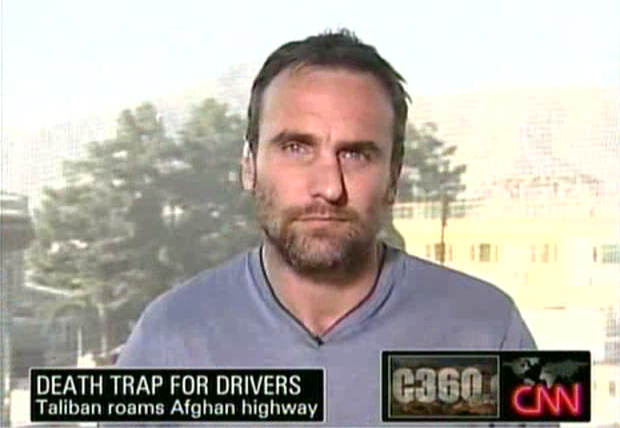AC: "There's going to have to be something dramatic happen here to see a reversal."
September 07, 2009

Length: 3:55
LARGE (45.3 MB) ----- SMALL (4.8 MB)
The first of the AC360 reports: the road from Kabul to Kandahar, which US forces had rebuilt just a few years ago, is now under the control of the Taliban. Michael talks with a truck driver who has to drive that route every week as he reports from a checkpoint at the Kabul end and a truck depot at the Kandahar end. There is also a recorded wrap-up.
(Michael's blog entry on this story is here.)
ANDERSON COOPER: There are setbacks and constant reminders of how dangerous and deadly the mission is in Afghanistan. Michael Ware found out first hand. He traveled on the road from Kabul to Kandahar. The U.S. helped rebuild that road. It used to be safe. Now it is now a Taliban death trap.
Here's Michael's report.
(BEGIN VIDEOTAPE)
MICHAEL WARE, CNN CORRESPONDENT (voice-over): The costs of the Afghan war are staggering. The loss of life, the billions upon billions of dollars, and yet what has it delivered? Looking around, talking to the U.S. military, it's clear: this war is not being won.
(on camera) For most ordinary Afghans, this perhaps is the simplest, clearest measure of that. This is Highway No. 1. It's here that Kabul ends, and 300 miles down that road is Kandahar and the Taliban heartland.
I remember when taking the journey from Kandahar to Kabul was more than 12 exhausting hours, but in 2004 American aid money repaved this road and cut that down to a mere five or six. Now, that journey is back to nine or ten hours. There's at least three known Taliban checkpoints on this American-paved highway. People are being pulled off buses and executed by the Taliban.
(voice-over) Truck driver Mohammed Qasim runs this Taliban gauntlet once a week. He hauls fuel in this tanker. The road, he says, is in terrible shape, wrecked by explosions. Drivers are left completely exposed.
"It's been blown up by land mines and there is no security on it," he says. A father of three, Qasim has to provide for his children. He takes his life in his hands each time he travels Highway 1. "I'm compelled," he tells me. "How else do we eat? There's simply no alternative."
Highway 1 looks like this. It is one of the most vital arteries in Afghanistan, rebuilt with almost $300 million in American aid money. Its asphalt rolls out from the capital, Kabul, to the west towards Kandahar, the nation's second largest city and a political epicenter.
(on camera) And this is the other end of that road. Kandahar is just a short distance down there; Kabul, hundreds of miles that way. But here in Kandahar, this is a city surrounded by pockets of Taliban resistance. Indeed, just a few miles down that dirt road is a Taliban-controlled district. A few miles up the highway is the first Taliban checkpoint.
The fact that the Taliban's been able to strangle the life out of this highway is a testament to the fact that there's simply not enough American, British, international or Afghan troops to secure it. What had once been an American project, hailed as a sign of progress, has now become a mark of a mission in crisis.
In talking to senior U.S. military here on the ground and others, that crisis is across the board with the mission. Militarily, the entire U.S. military strategy for the war in Iraq [he meant Afghanistan] right now is under significant review. As one commander put it to me, an American commander, "We can't move forward; we can't move back."
Politically, the nation is in limbo. The election results from the presidential runoff [he meant election] last month have been stalled from being released because of a storm of corruption allegations. As one senior American officer said to me, there's going to have to be something dramatic happen here to see a reversal -- Anderson.
(END VIDEOTAPE)
COOPER: We'll have more from Michael Ware throughout this week as we report to you live from Afghanistan.
American Morning ran the clip again with different graphics:
Length: 2:51
LARGE 33.0 MB) ----- SMALL (3.5 MB)
